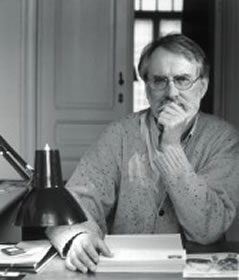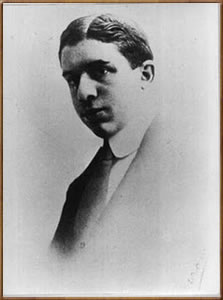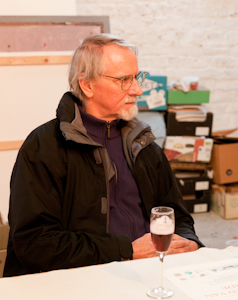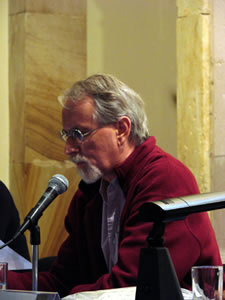De Vlaamse dichter en essayist Stefaan van den Bremt werd geboren in Aalst op 12 oktober 1941. Zie ook mijn blog van 12 oktober 2009.
Krekellyriek op het dorpskerkhof (Fragment)
Campagnol Lucien, zeg maar Lucien Kokkerd
(zeg maar niets… Priemt daar niet zijn puntneus
achter de hoek vandaan waar hij zijn adem
inhoudt?), Lucien dus, die Lucien, ligt ook
onder de zoden. Soms steekt tussen de zerken
iets naaldscherps onder arduin of marmer uit;
dan fezelen de doden: ‘Dat is ‘m, ’t is Lucien!
Je weet wel: Lucien Kokkerd! Hij heeft geen rust
voor hij erachter komt wat al dat dorpsvolk
hier ligt uit te spoken. Doe of je hem niet ziet,
en geen kwaad woord over de buren!’
Trinquecoste, Romain voor wie hem beter kent,
houdt tot op het kerkhof even koppig uitverkoop:
Alles moet weg! Hij is zo ongedurig, vindt geen vrede
vóór de hele bups de deur uit is: gebreide truitjes,
van het wachten op een klant verschoten, speeltjes
waar sinds jaar en dag alleen de houtmaden mee
spelen, de roerzeef die dat hevig middaglicht moet
zeven, een knuffelbeest voor peuters uit een tijd
die mét geschiedenis en al is opgeruimd, één paar
espadrilles, weggelopen uit La Grande Vadrouille
met Bourvil, die cactusachtige waar men gerust
een blad van af mag knijpen – stop het in een pot
vol magere aarde en het spul schiet uit…
Selbstporträt
Ich, der ich von Redseligkeit den Nachgeschmack
geschmeckt habe, und sie ist unbelecktund
pfeffert mir den Mund mit ihrem Schnack,
der beißend meine Zunge schreckt;
ich, der ich, wo es kribbelte, das Wort
gespürt habe als weißes Blatt
und schreibe so als würde ich seinen Mord
begehen, all das Weiße satt;
ich, der ich den Galopp von Hühnern ohne Kopf
gesehen habe, und wie alt war ich,
der ich das Herz, das stockend pocht,
gehört habe, so fürchterlich? –
Ich, der ich manches Buch und eine Blume
beschnuppert habe und verstumme.
Vertaald door Ard Postuma

Stefaan van den Bremt (Aalst, 12 oktober 1941)
De Italiaanse dichter Eugenio Montale werd geboren in Genua op 12 oktober 1896. Zie ook mijn blog van 12 oktober 2007 en ook mijn blog van 12 oktober 2008 en ook mijn blog van 12 oktober 2009.
Stolpern
Stolpern, hängen bleiben
läßt sich nicht vermeiden,
um die Sprache
aus ihrer Tumbheit aufzuschrecken.
Doch mit Stottern ist es nicht getan
es mag zwar weniger geräuschvoll sein
aber verdorben ist es allemal. So
hat man sich zu beschränken
auf ein halbes Sprechen. Einmal begab es sich,
das einer ganz zu sprechen wagte
und er blieb gänzlich unverstanden. Gewiß
hielt er sich selber für den letzten
Sprecher. Doch es kam anders:
Alle sprechen, nach wie vor
und nur die Welt ist seither
stumm.
Am Meer (oder beinahe)
Es zirpt die letzte der Zykaden
auf der gelben Eukalyptusrinde
die Kinder sammeln Pinienkerne,
unverzichtbar für die Galantine
eine Dogge jault hinter dem Eisengitter
einer nunmehr unbewohnten Villa
die Väter hatten sie erbauen lassen
doch keines der Kinder hat sie gewollt
Platz gäbe es darin für hunderttausend Bebenopfer
von hier aus sieht man nicht einmal ans Ufer
sofern man das noch Ufer nennen kann, diese achtzig Prozent Strand
an die Bademeister abgetreten
und es wäre wohl vermessen, hier
auf einen halkyonischen Frieden zu pochen
das Meer ist außerdem verpestet
während all der Abfall sich zusammendrängt
zu Wellen, kleinen Hügeln, Plastiken
mit dem Schwund der Hecken hat man auch
die entzückenden Sprosse des Rosts ausquartiert
die Zaun- oder Haubenkönige wie sie
die Dichter so gerne besingen Und da ist auch so manch Magnolienknospe
das Schild des Kinderarztes, doch die Kinder
vollführen lieber ihre Fahrradflüge
und kommen gut zurecht auch ohne seine Kuren
Wer sie in vollen Zügen atmen will
die Muse unsrer Zeit, die Dürftigkeit
der sei hierher verwiesen, ohne Grund zur Eile
es ist der dumpfe Schlag, der schaudern macht
nicht etwa das schleichende Schwinden, der süße Odem des Nichts
Hic manebimus, gefällt es euch? Nicht wirklich
überwältigend, doch alles Bessere sähe schon viel zu sehr
nach Sterben aus (und das gefällt allein den Jungen).
Vertaald door Theresia Prammer

Eugenio Montale (12 oktober 1896 – 12 september 1981)
De Amerikaanse dichter, criticus en vertaler Robert Stuart Fitzgerald werd geboren op 12 oktober 1910 in Springfield, Illinois. Zie ook mijn blog van 12 oktober 2008 en ook mijn blog van 12 oktober 2009.
The Shore of Life
I. I came then to the city of my brethren.
Not Carthage, not Alexandria, not London.
The wide blue river cutting through the stone
Arrowy and cool lay down beside her,
And the hazy and shining sea lay in the offing.
Ferries, pouring the foam before them, sliding
Into her groaning timbers, rang and rang;
And the chains tumbled taut in the winches.
Upstream the matted tugs in the heavy water,
Their soiling smoke unwrapped by the salt wind,
Footed with snowy trampling and snowy sound.
On tethers, pointing the way of the tide,
The crusted freighters swung with their sides gushing.
On evening’s ship pointing northward,
A golden sailor at sunset stood at the bow,
As aloft in the strands a tramcar with tiny clanging
Slowly soared over, far upward and humming still.
II. Not Athens, Alexandria, Vienna or London.
And evening vast and clean above the city
Washed the high storeys with sea-light, with a silken
Sky-tint on the planes and the embrasures:
The clump of crags and glitter sinking eastward
With the slow world, the shadow-lipping shores,
Pale after-conflagration of the air.
On terraces, by windows of tiredness,
The eyes dropped from that glow to the dusk atremble,
Alive with its moving atomic monotone:
There the hot taxis at the pounding corner
Fitted their glossy flanks and shifted, waiting,
And the girls went by with wavering tall walking,
Their combed heads nodding in the evening:
The hour of shops closing, the cocktail hour,
Lighting desire and cigarettes and lighting
The strange lamps on the streaming avenue.

Robert Fitzgerald (12 oktober 1910 – 16 januari 1985)
Hier met collega-dichter Harvey Shapiro (rechts)
De Amerkaanse schrijfster Ann Petry werd geboren op 12 oktober 1908 in Old Saybrook, Connecticut. Zie ook mijn blog van 12 oktober 2009.
Uit: Harriet Tubman: Conductor on the Underground Railroad
„Chesapeake Bay forms the western boundary of the section of Maryland which is sometimes called Tidewater Maryland, sometimes called the Eastern Shore. Here there are so many coves and creeks, rivers and small streams, that the land areas are little more than heads or necks of land, almost surrounded by water.
In these streams the ebb and flow of the tide is visible for miles inland-hence the name Tidewater Maryland.
In 1820, much of the Eastern Shore was heavily wooded. The streams were filled with fish. Game birds — wild duck and snipe — abounded in all of the coves and marshes. It could truly be said that every plantation thereabout “at its garden gate, has an oyster-bed, a fishing-bar, and a ducking blind.”
The plantation that belonged to Edward Brodas, in Dorchester County, was typical of this section of Maryland, for one of its land boundaries was a river-the Big Buckwater River. It was more or less isolated. The nearest village, Bucktown, was little more than a settlement composed of post office, church, crossroads store, and eight or ten dwelling houses.
There was an air of leisure about the planter’s life here. Fishing and hunting were an integral part of it, just as it had been part of the life of the Indians, who had practically disappeared from the Eastern Shore by 1750.
The house in which Edward Brodas lived was very large. There had to be room for his friends, his relatives, as well as his family. Visitors came from long distances, and so usually stayed a month or two before undertaking the journey back home. There were extra rooms for travelers, who carried the proper letters of introduction, because inns andtaverns offered uncertain lodging for the night.
Edward Brodas was known as the Master to his Negro slaves. His house, which the slaves called the Big House, stood near a country road. The kitchen was a small detached building in the rear, known as the cookhouse. Not too far away from the Big House were the stables, where the riding horses and the carriage horses, the grooms and the hostlers were housed.“

Ann Petry (12 oktober 1908 – 28 april 1997)
De Amerikaanse dichter en schrijver Paul Engle werd geboren op 12 oktober 1908 in Cedar Rapids. Zie ook mijn blog van 12 oktober 2008 en ook mijn blog van 12 oktober 2009.
Return in Autumn
The land unchanged, the cattle track,
Narrow for two split hooves to meet,
Winds to walnut grove and back
As when I walked it with bare feet,
Horses with no different eye—
Brown water flowing over stone—
Watch white-maned north wind running by,
Or corn from fields that they had sown.
New mood in older things must be
An inner change, mind’s bone grown longer,
Nerves less blind, more quick to see,
Blood’s cry for air turned stronger.
A man’s age like returning rain
Mingles with flesh it knew when younger,
Raising for him that bitter grain,
Remembered things, which ease no hunger.
Through that rain beating on my face
I see the huddled shape of days
That wandered with me in this place,
But lost their old and friendly ways.
Can I hills, horses understand,
And not past self? Yet here, I know
That one tense mind, one troubled hand,
Make present self forever go,
As frozen pond, the end of food,
Drives the southward duck to flying.
Though I return in autumn wood
I can find nothing but its crying.

Paul Engle (12 oktober 1908 – 25 maart 1991)
Hier in 1957 met Writers’ Workshop studenten
De Franse schrijver Louis Hemon werd geboren op 12 oktober 1880 in Brest in Bretagne. Hemon had het voorecht onderwijs te volgen aan het Lycee Montaigne en het Lycee Louis-le-Grand in Parijs. Na zijn licentiaat in de rechten aan de Sorbonne Hemon Louis in 1901 veranderde zijn carrière van richting en ging hij naar Engeland, waar hij werkte als tweetalig secretaris. In 1911 emigreerde hij naar Canada waar hij behalve in kantoorbanen (verzekeringen, secretaris) op landbouwbedrijven in de Frans-Canadese wildernis werkte, die op dat moment ver verwijderd was van enige modernisering en industrialisatie. Hier schreef Hemon zijn bekendste werk „Maria Chapdelaine.“
Uit: Maria Chapdelaine
„Au soir, le père Chapdelaine s’assit sur le seuil pour fumer et dit pensivement:
-François Paradis va passer bientôt. Il a dit qu’il viendrait peut-être nous voir.
Maria répondit: « Oui » très doucement, et bénit l’ombre qui cachait son visage.
Il vint dix jours plus tard, longtemps après la nuit tombée. Les femmes restaient seules à la maison avec Tit’Bé et les enfants, le père étant allé chercher de la graine de semence à Honfleur, d’où il ne reviendrait que le lendemain.
Télésphore et Alma-Rose étaient couchés, Tit’Bé fumait une dernière pipe avant la prière en commun, quand Chien jappa plusieurs fois et vint flairer la porte close. Presque aussitôt deux coups légers retentirent. Le visiteur attendit qu’on lui criât d’entrer et parut sur le seuil.
Il s’excusa de l’heure tardive, mais sans timidité.
-Nous avons campé au bout du portage, dit-il, en haut des chutes. Il a fallu monter la tente et installer les Belges pour la nuit. Quand je suis parti je savais bien que ce n’était quasiment plus l’heure de veiller et que les chemins à travers les bois seraient mauvais pour venir. Mais je suis venu pareil, et quand j’ai vu la lumière…
Ses grandes bottes indiennes disparaissaient sous la boue; il soufflait un peu entre ses paroles, comme un homme qui a couru; mais ses yeux clairs étaient tranquilles et pleins d’assurance.
-Il n’y a que Tit’Bé qui ait changé, fit-il encore. Quand vous avez quitté Mistassini il était haut de même…
Son geste indiquait la taille d’un enfant. La mère Chapdelaine le regardait d’un air plein d’intérêt, doublement heureuse de recevoir une visite et de pouvoir parler du passé.
-Toi non plus tu n’as pas changé dans ces sept ans-là; pas en tout; mais Maria…sûrement, tu dois trouver une différence!
Il contempla Maria avec une sorte d’étonnement.
-C’est que… je l’avais déjà vue l’autre jour à Péribonka.“

Louis Hemon (12 oktober 1880 – 8 juli 1913)
Zie voor onderstaande schrijver ook mijn blog van 12 oktober 2008.
De Oostenrijkse dichteres en schrijfster Paula von Preradović werd geboren op 12 oktober 1887 in Wenen.













